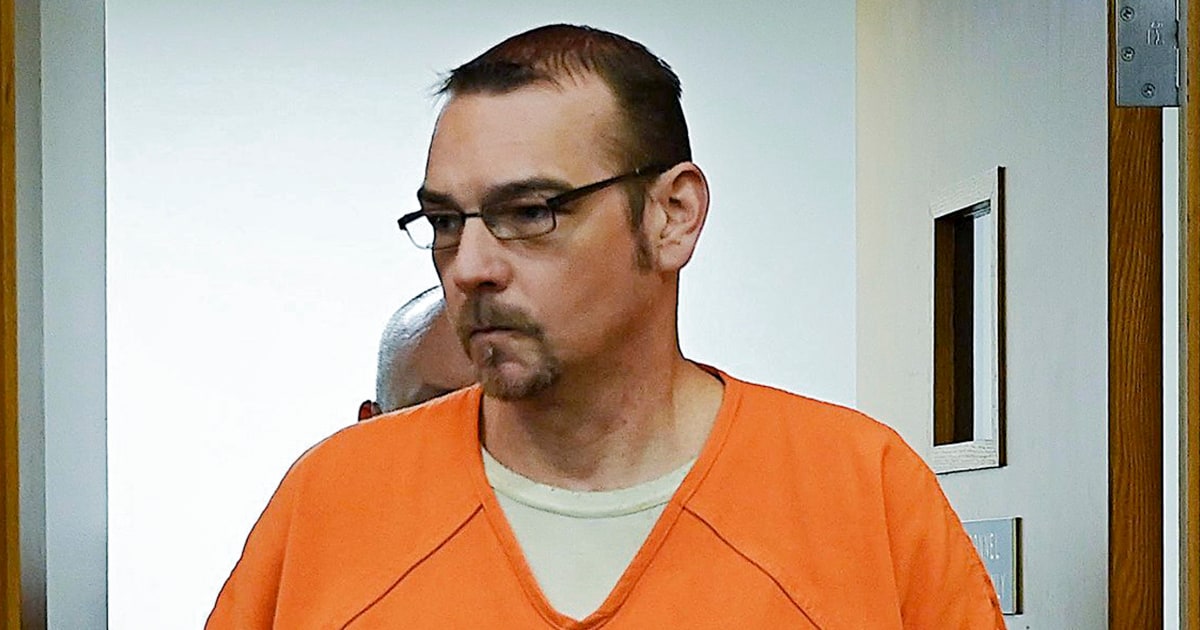
When Jennifer Crumbley took the stand during her involuntary manslaughter trial in February, the mother of Michigan school shooter Ethan Crumbley suggested safe storage of the family’s firearms was under the control of one person: her husband, James.
“It was more his thing,” she testified, “so I let him handle that. I didn’t feel comfortable putting the lock thing on it.”
Despite her attempt to deflect fault onto him, as their son used a semi-automatic handgun bought by James Crumbley to kill four high school classmates in 2021, a jury ultimately found her guilty — the first time in the U.S. that a parent was held criminally responsible for a school shooting perpetrated by their child.
James Crumbley, 47, now gets his day in court in the unsual case. His trial on an identical charge of four counts of involuntary manslaughter — each one representing a student who was killed — begins Tuesday with jury selection.
His wife’s trial was marked by dramatic testimony surrounding the day of the shooting and video from Oxford High School in suburban Detroit. Jennifer Crumbley, 45, often sobbed and hunched over in her seat as witnesses recalled the worst school shooting in Michigan’s history.
“It’s an entirely new trial. A new set of jurors,” said Mark Chutkow, a lawyer who previously led the criminal division of the U.S. Attorney’s Office in Detroit and is not affiliated with the case. “Although the facts will be mostly the same, there are some advantages to the defense this time around.”
Similar strategy
Chutkow said he expects Oakland County prosecutors to use the same “playbook” against James Crumbley as they did with his wife “because it worked.”
“Not only did they win a conviction, but it didn’t take the jury long,” Chutkow said of the deliberations, which lasted about 11 hours.
As with Jennifer Crumbley, a jury must determine if James Crumbley is guilty of involuntary manslaughter by either failing to store the firearm in a way that would have obstructed his son from gaining access to the gun and ammunition, or failing to exercise “reasonable care” of his son and prevent him from carrying out the massacre.
Prosecutors at Jennifer Crumbley’s trial called 21 witnesses, including law enforcement, co-workers of Crumbley and school staff, in an effort to depict her as a mother who failed to notice her son’s deteriorating mental health and had missed multiple warnings signs that her son was imminently planning to carry out a mass shooting.
James and Jennifer Crumbley were summoned to Oxford High School the morning of the shooting about a drawing their son had made of a gun, a person who was shot and a message, including, “The thoughts won’t stop. Help me.”
Neither parent at the meeting warned the school they had just bought him a gun, which school staff testified would have “completely changed the process that we followed.” And his parents declined to take him home after the discussion was over, which prosecutors said at Jennifer Crumbley’s trial were among the “many small things” that could have prevented the massacre later that day.
One juror later told NBC News that she came to the conclusion that Jennifer Crumbley was criminally responsible because she was the last adult known to have custody of the weapon before it was used in the shooting.
Video was shown to jurors of Jennifer Crumbley taking Ethan, then 15, to a shooting range the weekend before the massacre.
When Crumbley took the stand, she testified that it was her husband who decided to buy Ethan a 9 mm Sig Sauer a day after Thanksgiving 2021. She said James Crumbley owned other guns and was tasked with storing them with a lock.
During cross-examination, prosecutors suggested that while Jennifer Crumbley may have “entrusted” the responsibility of storing the 9 mm handgun to her husband after she took Ethan to the shooting range, it was “pretty clear you didn’t trust James with much,” noting that she had issues with him holding down a job, handling his money and even getting out of bed on time.
Whether James Crumbley was equally responsible, or perhaps more so based on his wife’s testimony, for keeping the firearm secured will be a major argument in his trial. James Crumbley had told investigators after the shooting that he would take Ethan to the range “all the time” to “teach him safety.”
The father also told investigators he had hidden the handgun in an armoire and placed the ammunition underneath jeans in another drawer.
“Nobody is saying you can’t own a gun, but the issue is gun safety,” said Carolyn Reinach Wolf, a New York attorney who specializes in mental health among families. “Now couple that with parents knowing what is going on with their child. If you look back in these cases of mass shootings, there were always warning signs.”
Defense approach
But James Crumbley’s defense may try to portray him as a more sympathetic figure compared to his wife, whose extramarital affair and preoccupation with her own hobbies became a way for the prosecution at her trial to suggest she neglected her son’s needs.
In addition, one advantage for James Crumbley’s defense is they can scrutinize how his wife’s lawyer presented her case and tweak their messaging accordingly, Chutkow said. A recurring point made by Jennifer Crumbley’s lawyer was that parents of teenagers can’t be expected to know everything happening in their lives, and even a parent with the best intentions can’t always foresee tragedy.
“The defense may want to articulate something like that again and plant that seed in jurors’ minds that ‘there but for the grace of God go I,'” Chutkow said.
But whether James Crumbley will take the stand as his wife did must also be carefully considered, he added.
When questioned by her lawyer, Jennifer Crumbley said she regretted her son’s actions but that she didn’t believe she failed as a parent and that she “wouldn’t have” done anything differently in how she parented him.
The juror who later spoke with NBC News said the mother’s words were “very upsetting to hear” and repeated in the jury room.
“I think that there are many small things that could have been done to prevent this,” the juror said.
Son’s mental health
Another key part of James Crumbley’s trial will be how much he knew of Ethan’s mental state and whether he failed to seek treatment for him that would have averted the rampage.
At her trial, Jennifer Crumbley testified that she realized her son was feeling troubled, “depressed” and “acting sad,” particularly when a best friend moved away, yet she never thought to seek the help of a mental health professional in the months before the shooting.
When prosecutors presented text messages from Ethan to his mother that he was seeing demons and “the house is haunted,” Jennifer Crumbley downplayed them, saying he enjoyed “messing with us” because that was his personality.
Ethan Crumbley, now 17, was charged as an adult in the shooting and pleaded guilty to two dozen counts, including murder and terrorism. He was sentenced in December to life in prison without parole.
While he didn’t testify at his mother’s trial and also won’t at his father’s, Ethan’s texts and journal writings will again be scrutinized as they relate to the charges against James Crumbley.
At Jennifer Crumbley’s trial, the jury heard excerpts from Ethan’s journals in which he wrote, “My parents won’t listen to me about help or a therapist,” and that he expressed his desire to “shoot up” his school and said he was going to get a 9 mm pistol.
James Crumbley’s lawyer, Mariell Lehman, tried unsuccessfully to block those journal entries from being admitted as evidence in his case as well as text messages in which the shooter told his friends that he was “mentally and physically dying,” and about a time he asked his father about going to the doctor, but said he was given pills and told to “suck it up.”
Oakland County Circuit Court Judge Cheryl Matthews called the request “an untimely motion for reconsideration” and said she will stand by her ruling made before the mother’s trial began about which journal entries and texts the jury can hear.
Key events in the Oxford High School shooting
- Nov. 30, 2021: Sophomore Ethan Crumbley, 15, opens fire, killing four schoolmates — Madisyn Baldwin, 17; Tate Myre, 16; Hana St. Juliana, 14; and Justin Shilling, 17 — and injuring seven others.
- Dec. 1, 2021: Ethan Crumbley is charged as an adult with four counts of first-degree murder, one count of terrorism and other charges.
- Dec. 3, 2021: Prosecutors announce involuntary manslaughter charges against parents James and Jennifer Crumbley.
- Dec. 4, 2021: The parents plead not guilty.
- Feb. 4, 2022: A judge rules the parents must stand trial.
- Oct. 24, 2022: Ethan Crumbley pleads guilty in the shooting.
- Dec. 8, 2023: He is sentenced to life in prison without the possibility of parole.
- Jan. 25: Opening statements begin in Jennifer Crumbley’s trial.
- Feb. 6: Jennifer Crumbley is found guilty of involuntary manslaughter.
Lehman also attempted to argue that Ethan Crumbley’s psychological records would show that he did not tell his father about his mental health issues and that James Crumbley did not know his son had obtained access to the gun. But after a sealed hearing, Matthews stood by her previous ruling that those records were privileged.
Chutkow said it makes sense that the judge will want to keep the evidence and what is admissible similar in both trials, as Jennifer Crumbley awaits her sentencing in April and may ultimately appeal the verdict.
A gag order imposed by Matthews in 2022 bars both county prosecutors and the lawyers for the Crumbleys from speaking to the media.
The judge has permitted at least two new witnesses to testify at James Crumbley’s trial: the original owner of the 9 mm handgun, who sold the weapon and a cable lock to a gun store where James Crumbley bought it, and a student who was injured in the shooting.
The defense attempted to argue hearing from a student would “inflame the emotions” of the jury.
Matthews denied a request to move the trial outside of Oakland County because of the defense’s concerns over jury impartiality, but in a win for the defense, the judge is increasing the number of peremptory challenges, or strikes, that lawyers on both sides can use to dismiss potential jurors from sitting on the case for any reason.
The majority of jurors selected for Jennifer Crumbley’s trial were either gun owners or were familiar with firearms.
Given the publicity surrounding her trial, there will be unique issues in finding potential jurors who might not have a strong opinion about the case, said Wolf, the attorney who specializes in mental heath cases.
But ultimately, she said, James Crumbley’s defense will be able to show a “different perspective and history” from his wife’s trial.
“They can argue that he wasn’t aware of certain things — whether that will be believed by the jury is the question,” Wolf said. “For both parents, this was their child. He lived in their home.”
Source: | This article originally belongs to Nbcnews.com










